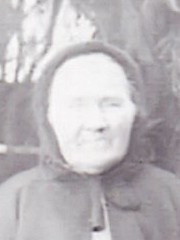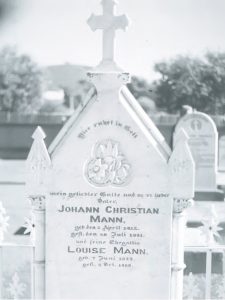A life of challenges

My great grandmother, Johanne Louise (“Louise”) Bradtke was the eldest child of the 9 Bradtke children who arrived in South Australia on the Heerjeebhoy Rustomjee Patel in 1845.
Louise was born in Cicha Gora, Posen, Prussia, to Anna Rosina Dorothea Schlinke (later Bradtke) on 7 June 1823 but details of her father are unknown[1].
On 29 January 1823, her mother was married to Johann Gottfried Kucke, the eldest son of Johann Gottfried Kucke and Rosina Dorothea nee Haemmerling[2] of Cicha Gora, but his name was not included on Louise’s birth certificate. I have not yet found Kucke in the family trees of my DNA matches from Ancestry.
On 12 November 1829, Rosina Dorothea married Wilhelm Bradtke.
Wilhelm adopted Louise as his daughter and she took his surname.
In May 1845, she left Bremerhaven with her parents and seven half-siblings (another born enroute) on the Heerjeebhoy Rustomjee Patel, arriving in Port Adelaide on 17 or 18 September 1845 (117 days after leaving Bremerhaven).
Bradtke Family History[3] suggests they were probably met in Port Adelaide by her uncle Daniel Schlinke[4] and taken to live with him in Bethany.
Four crude homes were built along the creek to Schlinke’s Mill: Schlinke, Bradtke, Mann and Schrapel families[5].
Louise was married to Johann Christian Mann (“Christian”) on 27 November 1847 in Bethany Lutheran Church by Pastor GD Fritzsche.
Christian and Louise had 9 children in 15 years.
They lived at first in the Tanunda district, farming at Bethany. In November 1853, they bought land between Kersbrook and Williamstown. Hoffnungstahl[6] would have been their nearest Lutheran Church and the church register lists them as members there between 1851 and 1857. This land was sold in 1857 by public auction by order of the mortgagee[7]. They returned to Bethany, where the next 3 children were born, and one daughter was buried. In 1861, Christian bought 113 acres between Rosedale and Gomersal. In 1868, Christian Mann was listed[8] as a farmer at Rosenthal[9] in the Barossa Valley of South Australia.
About the beginning of 1870 they moved north to the Robertstown-Point Pass district, which was at first known as Emu Flats.
The Mann family joined the Immanuel Lutheran Church at Point Pass.
Louise died on 5 October 1908 in Point Pass, South Australia and is buried with her husband, 4 children and 5 grandchildren in the Point Pass Immanuel Lutheran cemetery.

Her will dated 27 June 1908[10] left the real estate (Section 136 in the Hundred of English) to her 8th child, Gustav Adolph, proceeds from the sale of her livestock to Die Lehranstalt zu Point Pass[11] and the horse and buggy to Mrs Leidig, the pastor’s wife[12].
An auction to sell items from her estate was to be held at Tuesday 8 December 1908 at the Eudunda Market by C. von Bertouch and Co. Some of the sale items included:
- 200 ewes;
- 20 stud, fat and lean cattle;
- 20 heavy and light horses;
- 15 pigs;
- 2 harvestersand sundries;
- 3 young and useful horses;
- 2 foals; and
- 5 stud cattle[13].
[1] Father’s name left blank on her birth certificate.
[2] Ancestry.com has identified 4 DNA matches who have Hemmerling/Haemmerling in their family tree. More research is required.
[3] Published in 2000, ISBN 0-646-40154-8.
[4] He arrived on the Catharina in 1839. Daniel Schlinke was a miller at Bethany.
[5] An enterprising Bethany icon/ business disappeared after seven years: Schlinke’s Mill. Bethany Heritage SA, https://www.facebook.com/groups/813512832849331/, accessed 13 August 2022.
[6] Hoffnungsthal (Valley of Hope) is the location of a former German pioneer settlement, located in South Australia’s Barossa Valley. Founded in 1847, it was located in an ephemeral lagoon which was dry for the first years of settlement. Local Peramangk people warned the settlers that the area was prone to flooding, but this advice was ignored. In October 1853, after a week of heavy spring rains, the village was flooded and many of the houses were evacuated. After the cost of a proposed drain was seen as prohibitive, the village was eventually left deserted. Most of the settlers moved to the Barossa village of Bethany as well as further afield. Built on higher ground, the Lutheran church was still used until 1867, when the building was also abandoned. https://en.wikipedia.org/wiki/Hoffnungsthal,_South_Australia
[7] Preliminary Notice of Sale, Adelaide Observer, 20 December 1856, page 1, http://nla.gov.au/nla.news-article161262900.
[8] City Directories, 1868.
[9] Rosedale is a small town in the south western Barossa Valley in South Australia. Prior to renaming placenames of enemy origin in 1918, Rosedale was named Rosenthal. The locality of Rosedale spans the North Para River. https://en.wikipedia.org/wiki/Rosedale,_South_Australia
[10] https://www.familysearch.org/ark:/61903/3:1:3Q9M-CSGG-49GZ-V?cc=3007557&personaUrl=%2Fark%3A%2F61903%2F1%3A1%3A79Y9-J92M, accessed 29 August 2020.
[11] Point Pass Lutheran School.
[12] Georg Friedrich Leidig (1870-1925), Lutheran clergyman, went to Point Pass in 1892 to serve a scattered rural parish, ultimately comprising eight churches. Three years later he realized his vision of a boarding institution as a centre to instruct his confirmees, train teachers for Lutheran day schools and to offer higher education. This evolved into Immanuel College. He had married Maria Margaretha Regina Eckardt of Gunzenhausen, Bavaria, at Yorketown, South Australia, on 3 August 1892. She was the loved ‘mother’ of all students, as well as their own three sons, two of whom studied in Germany. He travelled widely, including visiting Germany, to arouse interest in the college. Leidig guided his Church through difficult times, including the impossibility of conducting the Church’s normal annual conventions during and after World War I caused the responsibility for far-reaching decisions to fall on him, including financeustralian Dictionary of Biography, https://adb.anu.edu.au/biography/leidig-georg-friedrich-7163, accessed 26 September 2021.
[13] Australische Zeitung, 2 Dec 1908 Page 5, https://trove.nla.gov.au/newspaper/article/230924078?searchTerm=Eudunda%20Markt%20von%20Bertouch&searchLimits=l-decade=190|||l-year=1908|||l-month=12